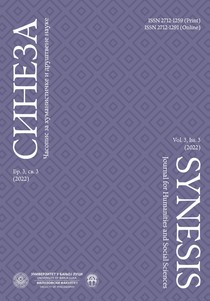Apofenija kao divergentno mišljenje: funkcija apofenije u kreativnosti
Apophenia as divergent thinking: Role of apophenia in creativity
Author(s): Marija KušićSubject(s): Cognitive Psychology, Personality Psychology, Behaviorism
Published by: Filozofski fakultet, Univerzitet u Banjoj Luci
Keywords: creativity; apophenia; divergent thinking; convergent thinking;
Summary/Abstract: This paper examines the relationship between apophenia—the tendency to see patterns where there are none (Brugger, 2001), and creativity—understood as the production of new and appropriate (useful) ideas, solutions, or products (Nijstad et al., 2010; Runco & Jaeger, 2012). To do so, we first outline the historical background of the study of creativity, the contemporary definition of creativity, and both traditional and contemporary models of creativity. These sections provide a theoretical framework for understanding creativity through both processes of divergent generation of new ideas and selective or convergent control processes which make those new ideas adaptive/appropriate. Precisely contemporary cognitivist models view creativity as non-specific, fundamental cognition and recognize both divergent and convergent processes as necessary for creative ideas (Cropley, 2006; Ward, Smith, & Finke, 1999), while traditional models understand creativity as specific cognition (Mednick, 1962). Apophenia, besides referring to false positives, also represents the production of new but useless and inappropriate ideas and is, hence, the ideal example that reveals the need for establishing the necessary role of convergent processes alongside divergent ones in creativity. Examining the relationship between apophenia and creativity not only betters the understanding of creativity and provides further arguments for contemporary models of creativity as non-specific cognition but also positions apophenia as an underinvestigated phenomenon in relation to cognitive processes of idea production. To examine this relationship, it is necessary to take the position of contemporary cognitivist models of creativity. Therefore, the formation of new and unusual ideas can be seen as a consequence of divergent processes exclusively. Convergent processes further limit the divergent ones and enable the formation of new and useful ideas that are rightfully called creative. Given the assumptions about the roles divergent and convergent processes have in creativity (Cropley, 2006; Ward, Smith, & Finke, 1999), apophenia can be seen as another result of divergent processes. In other words, if convergent processes do not mediate divergent ones, divergent thinking consequently leads to new and useless— apophenic—ideas.
Journal: Sineza
- Issue Year: 3/2022
- Issue No: 3
- Page Range: 75-106
- Page Count: 32
- Language: Serbian

